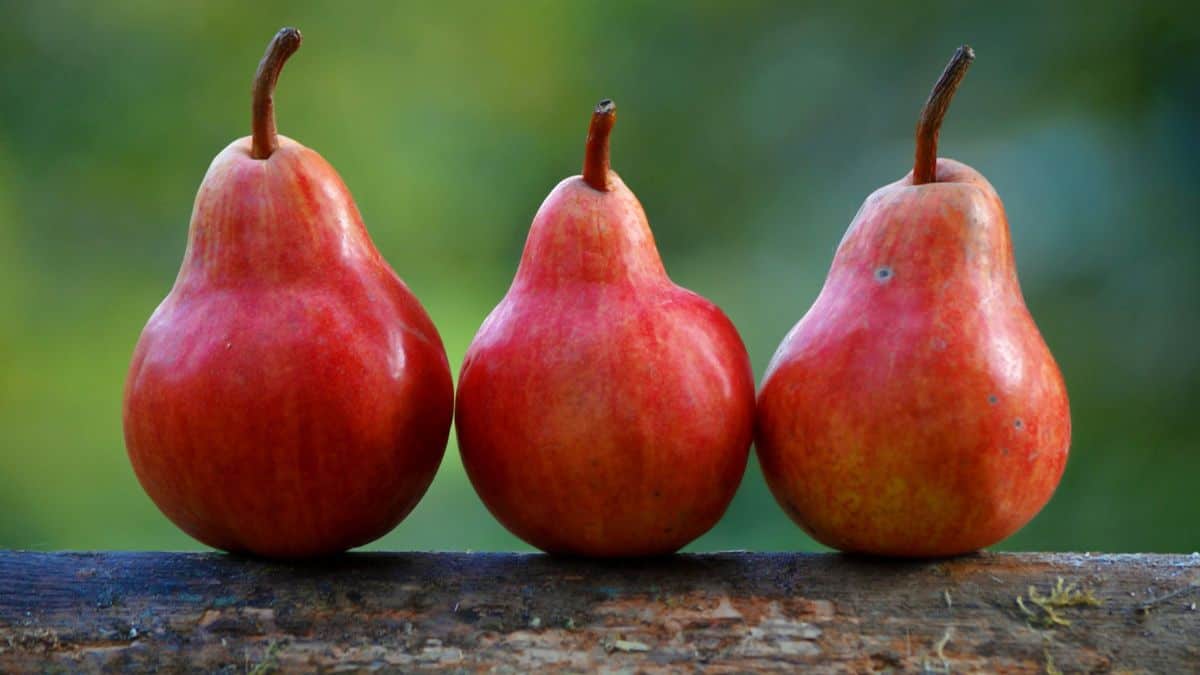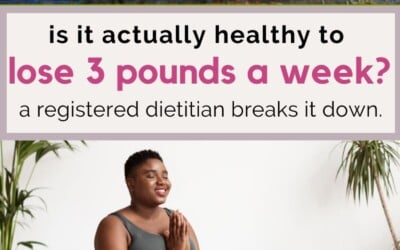Sometimes weight and health can feel deceptively simple. Got a goal of weight loss by a specific date? You look at the number of weeks you have until D-day, compare that to the number of pounds you’d like to lose, and then have a goal: lose, say, three pounds a week until you reach your target.
Wham, bam, thank you ma’am, right?
Not so fast!
Queen: your weight, health, and long-term relationship with food and eating are far more complex than a target number on the scale, the number of calories you budget, or points that you’re tallying.
And spoiler alert: weight is actually a pretty terrible measure of health. If you’re new around here, welcome! I’m Colleen, non-diet-y registered dietitian here to help you cultivate your intuitive eating skills so that you can live your best, most healthy life.
In this blog post, I’ll walk you through what healthy weight loss can look like and pull the curtain back on the dark side of dieting and trying to lose too much, too fast. I’ll also share my best tips for how to actually measure your health (clue: it isn’t on the bathroom scale.).
Let’s dive in!

Is it possible to lose 3 pounds a week?
First off, is it possible to lose three pounds in a week? Sure.
Just like it is possible to survive for a while only on ramen noodles and peanut butter sandwiches if your grocery budget is down to nothing.
But is it recommended or optimal to lose 3 pounds per week? Probably not.
For most of us, we could probably manipulate our eating habits to provide less energy than our body needs and/or increase our exercise so that our body is hungry.
Make that gap big enough and you can see big changes in your weight, even several pounds in a week.
But this pace won’t last forever. And the results probably won’t stick.
Your body is really invested in keeping you alive. If you are not eating enough, your body thinks that you’re in a famine and will make adjustments to keep you going until more food is available.
Your body doesn’t know that these limits on what you’re eating are self-imposed.
With less energy coming in, your body will lower your metabolism so that you’re using less in your daily activities like breathing, walking around, and digesting food.
If the energy deficit continues, your body will break down muscle. Less muscle = lower metabolism again.
And if the too large energy deficit continues, your body will continue to make sacrifices in order to fuel the most important functions (breathing!) and wind down things that can wait (like having a period).
The funny thing is that when we talk about “weight loss” what we really mean is “fat loss”. But if you’re approaching weight loss with unrealistic expectations, you may end up losing muscle tissue – no bueno.
Is there any amount of healthy weight loss?
This is a surprisingly complicated question, to be honest.
In general, many doctors, nurses, and even dietitians might recommend not trying to lose more than 1-2 pounds per week. This may be fast enough to keep you motivated and on track, but not so fast that you’re risking a loss of muscle tissue and having your metabolism go into hibernation.
But here’s the (major) catch: in practically every study done on weight loss ever, weight loss doesn’t last. Like, I’m talkin’ 95% doesn’t last.
While weight regain isn’t “bad” per se, it can have a big impact on your mood and mental health.And the constant yo-yo-ing of your weight going up and down is likely to be harmful to your health and raise your risk of disease.
…but they lost weight
It isn’t hard to find examples of people who lost weight, even a LOT of weight. One extreme example is the contestants on the TV show The Biggest Loser. While on the show, contestants dedicate their entire lives to weight loss; spending hours and hours exercising and eating very few calories.
And they lose weight. A lot of it. It makes for good TV ratings and makes you feel that if you were to also take these extreme measures, you’d also lose weight.
But what about once the show is over? The weight loss doesn’t stick. And, weight cycling leads to worse health outcomes – damn!
And let’s be very clear: this weight cycling is not due to any kind of “failure” or lack of dedication of the contestants – this weight rebound is their biology at work. Losing so much weight in such an extreme way makes your body think that it needs to protect itself; your body will pack on more weight because it thinks “OMG! What if she starves me again in the future?”
Your body thinks that it is better to pack on some extra padding/energy/weight to have on hand and have the energy to pull from in case you’re ever in a starvation situation again.
So while The Biggest Loser is an extreme example, we see this play out again and again in research (and in personal experience): weight loss almost always cycles back to weight regain.
Oh, and, PS? The study done on biggest loser contestants showed that their metabolism continued to adapt and slow well beyond the initial weight loss and into the “maintenance phase”. Essentially, if they wanted to KEEP the weight off they would have to quite literally increase their exercise amounts for life… big yikes.

Too much weight loss will always backfire
Having your weight cycle up and down is quite the mind f*ck.
It makes you think that you’re the problem, that you don’t have enough willpower, and that you’re a loser.
That is 100% not true – you’re a queen.
Having weight loss be the measure of success carries significant risks to your mental health and body image.
Losing too much weight too fast could put you at risk of many health problems, including:
- muscle loss and a drop in metabolism
- gallstones
- nutritional deficiencies
- worse cholesterol labs
So…you’re probably wondering what to do instead when everyone and their mother says that losing weight is the way to go? Glad you asked.
It is time to talk about Intuitive Eating.
Intuitive Eating fosters true health
Intuitive Eating is an approach to wellness that is all about working with your body, not trying to micromanage every little thing. With Intuitive Eating, you do not need to have an app or calorie count tell you how much to eat or when; you and your body are in a trusting relationship.
It isn’t the “just eat anything” diet. If you’re new to IE, bookmark this post to check out later: Intuitive Eating for Beginners: Start Here.
Your health and wellness are a complex tapestry of your genetic history, your environment, and things that you cannot control or change. It also includes your behaviors, such as how much you sleep, move, eat veggies and drink water.
This cannot be summed up by the number on the scale.
So instead of seeking a specific weight or a specific number of pounds lost per week, I recommend cultivating a healthy relationship with your body, your food, and your eating.
This is a helluva lot harder to do than to say, but it works to cultivate real, lasting health. And we have SO much research to back this like this study showing that when you take this non-weight-focused approach you’ll likely have a healthier diet overall and have better health outcomes like lower triglyceride levels, higher levels of high-density lipoproteins, and improved cardiovascular health. IDK about you but count me IN!
When you don’t have a specific weight as the measure of success, this is what is known as “weight-neutral” care. It doesn’t mean that you throw all goals out the window, it just means that you’re measuring your journey differently and building habits that you actually enjoy (and so will actually stick).

Will I gain weight with IE?
Once people learn about Intuitive Eating for the first time, the most common question that they have is about weight: they’re worried that without the structure of a diet, they’ll lose all control and gain a lot of weight.
And that feels so dang scary.
The truth is, I can’t predict what your body will do when you release your food rules.
Some people will lose weight, some will gain weight and some won’t change at all.
But for anyone who is focusing on improving their relationship with food and building habits that stick, their health is improving overall. Pinky promise.
I recommend checking out this post for more info: Understanding Intuitive Eating Weight Gain.
That’s a wrap
While it is possible to lose 3 pounds a week for a while, I don’t recommend it.
Not only will that weight probably return, but sooner or later, you’re causing harm to your body and metabolism by trying to micromanage your weight. True lasting health is measured by your behaviors, not by a number on the scale.
And while some folks do lose weight with Intuitive Eating, some won’t. I know how scary that can feel, so I have created a totally free guide that you can download today. It will give you the real science behind weight and health and start to change the narrative we’ve all been fed by our society that prioritizes size over almost anything else. This unlearning doesn’t happen overnight, but with time, it will sink in (and boost your real health). Check it out!
XOXO
-Colleen

Intuitive eating sounds great but…won’t I just gain weight?!
Find out what might happen to your weight when you get rid of your food rules, the research behind Intuitive Eating, and why if your goal is long-term health, breaking up with diets is the way to go.






Leave a Reply